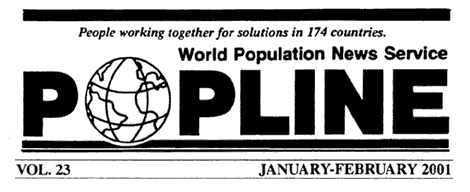|

Soaring Population Threatens Security
Changes in population, scarcity of water and
the spread of disease worldwide will have an increasing
impact on the national security of the United
States, the U.S. intelligence community has concluded.
The assessment is contained in an intensive yearlong
study prepared by the National Intelligence Council,
an influential analytical think tank made up of
senior intelligence officials that work alongside
the U.S. Central Intelligence Agency.
Entitled "Global Trends 2015," the 70page report
estimates that 3 billion people, nearly half of
the world's population, will live in "water-stressed"
regions from southern California to northern China,
and that even more genetically modified crops
or desalination projects will not substantially
alleviate the problem.
By 2015, world population will grow from the
current 6.1 billion to 7.2 billion, the report
estimates, with 95 percent of the increase expected
in the developing world and nearly all of it in
rapidly expanding urban areas.
Population pressures are expected to ensure that
Middle East will be a regional trouble spot over
the next 15 years as population burgeons anywhere
from 26 percent in Algeria and 39 percent in Libya
to 56 percent in Saudi Arabia.
People of the region will be poorer, heavily
concentrated in cities unable to cope and mere
disillusioned with their governments. The report
warns that as inequities continue to mount, Islamic
fundamentalist movements may come to power.
Water shortages are expect to constitute the
key resource problem of the next decade and a
half, and could cause regional instability. Turkey's
construction of new irrigation projects on the
Tigris and Euphrates rivers would reduce water
flowing into Syria and Iraq. Similarly, ambitious
projects in Ethiopia and Sudan could divert water
from the Nile and reduce the flow into Egypt.
John Gannon, chairman of the National Intelligence
Council, said the purpose of the report is to
encourage policy makers to focus on long-term
global trends and to think beyond the ordinary
concerns of the intelligence community.
|